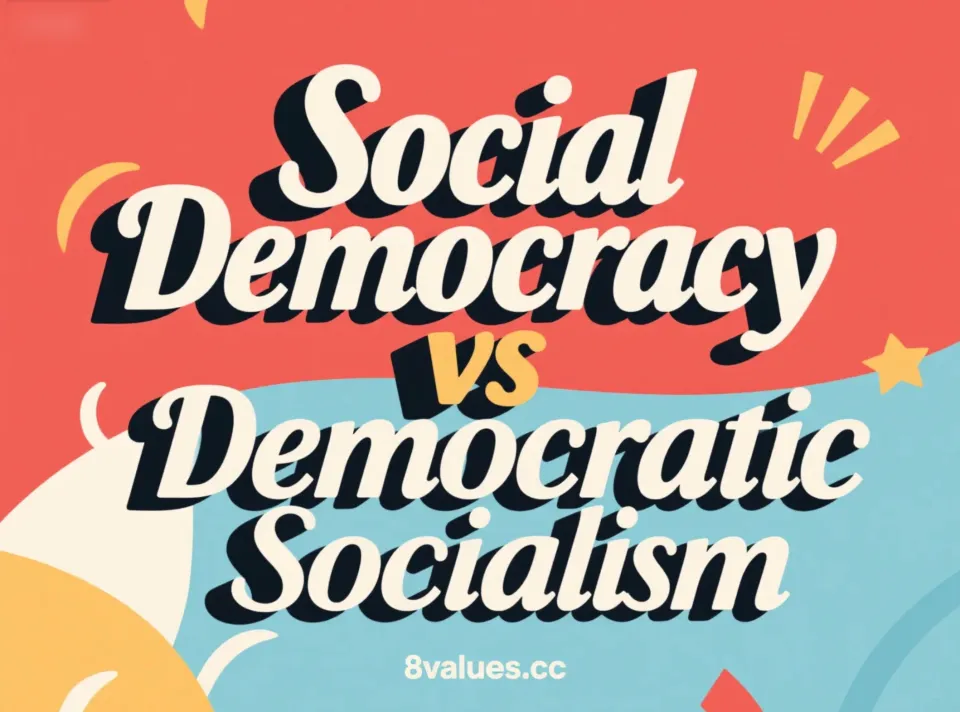Марксизм | 8 Обзор интерпретации идеологической идеологии в политическом тесте
Исследуйте марксизм, социальную, политическую и экономическую теоретическую систему, которая сильно повлияла на мир. Понять идеологическое происхождение Карла Маркса и Фридриха Энгельса, основных концепций, критики капитализма и видения социализма и коммунизма. Благодаря 8 ценностям политической идеологии мы можем глубоко понять этот сложный и разнообразный философский метод, социологию, политическую экономию и революционную идеологию и получить представление о своей уникальной интерпретации ключевых вопросов, таких как исторический материализм, классовая борьба, избыточная стоимость и отчуждение, чтобы лучше проанализировать экономическую деятельность и руководство социального изменения современного общества.
Марксизм является всеобъемлющей теоретической системой, совместно основанной немецкими философами Карлом Марксом и Фридрихом Энгельсом в 1840 -х годах. Он обеспечивает экономическое, политическое и социальное мировоззрение, основанное на историческом материализме, диалектике и глубокой критике капитализма. Эта теория направлена на то, чтобы прояснить доктрину полного освобождения пролетариата и всего человечества по всему миру, и оказала глубокое и обширное влияние на современную политическую философию и социальные движения. Тем не менее, марксизм - это не набор жестких догм, а научная система, которая развивается разнообразно, постоянно обогащает и улучшает различные области и проблемы, и содержит много теоретических школ, которые кажутся противоположными или даже противоречивыми. Как однажды сказал сам Маркс: «Я не марксист», это отражает разнообразную интерпретацию и развитие его мыслей в последующих поколениях.
Происхождение мысли марксизма и фон времени
Карл Маркс (1818-1883) родился в Трире, Германия, и провел большую часть своей жизни в Лондоне и в конечном итоге был похоронен на кладбище Хайгейт, Лондон. Он и Фридрих Энгельс были друзьями на всю жизнь и мыслимыми партнерами. Теоретическая структура марксизма была построена ими в середине до конца 19-го века.
Формирование теории Маркса неотделимо от глубокого происхождения европейской промышленной революции в 19 веке. В течение этого периода Великобритания и другие страны пережили радикальные социальные изменения: старая феодальная система постепенно рухнула, обычные люди потеряли свои общие права на землю, были вынуждены въезжать в фабрики и стали рабочей силой заработной платы владельцев фабрики. Рабочая среда завода является суровой, работа опасна, заработная плата чрезвычайно низкая, а детский труд распространен, и все это привело к серьезному социальному неравенству.
Когда Маркс и Энгельс основали марксизм, они критически унаследовали и поглощали выдающиеся достижения человечества в естественных науках, мышлении науки и социальной науки. Его основные теоретические источники включают в себя: немецкую классическую философию (особенно диалектическую мысль Гегеля), британская классическая политическая экономия (такая как теории Адама Смита и Дэвида Рикардо) и французский утопический социализм. Они критически изменили эти идеи и сформировали уникальную теоретическую систему.
Основной состав марксизма: философия, политическая экономия и научный социализм
Марксизм - это полная научная система, состоящая из трех основных компонентов: марксистская философия, марксистская политическая экономия и научный социализм. Эти три взаимосвязаны, чтобы сформировать органическое целое.
Марксистская философия: диалектический материализм и исторический материализм
Марксистская философия - это методология марксизма, которая обеспечивает метод и перспективу для изучения мира. Марксистская философия в основном включает в себя диалектический материализм и исторический материализм. Он исследует социальное развитие с материалистической точки зрения, полагая, что человеческое общество основано на его экономической деятельности, и что структура и производственная модель экономических организаций являются фундаментальными источниками межличностного общества, политики, права и моральных отношений. Исторический материализм считает, что производственный труд материальных живых материалов является основой для существования и развития человеческого общества, а противоречивое движение между производительностью и производственными отношениями является фундаментальной движущей силой для замены социальных форм.
- Материализм : Марксизм считает, что в конечном итоге определяется человеческое существование, - это материальная реальность, а не Бог, мысль или язык. Сознание определяется социальным существованием, а человеческое общество основано на материальной производственной деятельности.
- Диалектика : на Маркса глубоко повлияла диалектика Гегеля, но он «перевернул гегель с ног на голову». Маркс полагал, что развитие общества полно противоречий и напряженности, которые основаны на материальности общества, а не концепциями. Например, конфликты между социальными классами в конечном итоге приводят к революции и изменениям.
- Исторический материализм : это основа Маркса для анализа социального развития и изменений. Он считает, что социальная структура, политическая система и идеология основаны на экономической деятельности, то есть «экономической основе» и «надстройки» общества. Исторический материализм считает, что человеческое общество прошло через такие этапы, как примитивное общество, рабское общество, феодальное общество, капиталистическое общество, и в конечном итоге превратится в социалистическое и коммунистическое общество.
Марксистская политическая экономия: критика механизма капиталистической эксплуатации
Марксистская политическая экономия является основной частью марксизма и в основном изучает производственные отношения. Он критикует эксплуатацию капитализма труда и генерацию избыточной стоимости. Маркс считает, что капиталисты накапливают богатство, свободное владение «избыточной стоимостью», созданной работниками, а обращение с работниками - это не то, что заботятся капиталисты.
- Трудовая теория ценности (LTV) : Маркс унаследовал и разработала теорию трудовой ценности классических экономистов, полагая, что ценность товара определяется социально необходимым временем труда, необходимым для производства товара.
- Избыточная стоимость : Маркс указал, что капиталисты накапливают богатство, занимая «избыточную стоимость», созданную работниками бесплатно. Стоимость, создаваемая трудом работников, превышает стоимость их заработной платы, и эта часть неоплачиваемой стоимости является избыточной стоимостью, которая составляет источник эксплуатации.
- Эксплуатация : в рамках капиталистической системы, поскольку работники не владеют инструментами производства, они должны работать на капиталистов в обмен на потребности жизни, поэтому эксплуатация неизбежна. Маркс полагал, что эксплуатация является общей экономической характеристикой всех классовых обществ.
Научный социализм: план бесклассового общества
Научный социализм - это пункт назначения марксизма, который изображает будущее общество, которое заменяет капитализм. В отличие от раннего «утопического социализма», Маркс и Энгельс полагали, что социализм основан на научном анализе неотъемлемых противоречий капитализма, а не моральных требований или идеальных концепций. Он направляет теорию о том, что пролетариат движется к победе. Он предсказывает, что социализм появится из революции и возвращает инструменты производства в коллектив, распределяет прибыль на основе «реального труда» каждого человека и планирует производство, основанное на «спросе», а не на прибыли. Маркс также указал, что после социализма будет рожден коммунизм и станет обществом без занятий, границ, валюты и самоотверженных прав собственности, и достичь «каждый может сделать все возможное и получить то, что им нужно».
- Неизбежность революции : Маркс полагал, что неотъемлемые противоречия капитализма неизбежно приведут к пролетарской революции и свергнут существующую капиталистическую систему.
- Диктатура пролетариата : это рассматривается как «переходная стадия» перехода от капитализма к коммунизму. Маркс подчеркнул, что это не диктатура в нынешнем смысле, а скорее относится к политической силе рабочего класса, чтобы подавить контрреволюционные силы старого правящего класса и постепенно отменить различие в классе.
- Коммунизм : конечная цель марксизма - это общество без классов, государства, валюты и самоотверженных прав собственности, чтобы достичь «каждый может сделать все возможное и распространять его по мере необходимости». В нем подчеркивается социальная общность производственных инструментов и планов, основанных на «спросе», а не на прибыли. Маркс различил «частную собственность» (используется для использования средств производства других) и «личной собственности» (личные ежедневные потребности), и коммунизм, направленный на отмену частной собственности.
- Ассоциация свободных людей : Маркс задумал «комбинацию свободных людей», в которой производители совместно решают, как распределять и использовать избыточные продукты для достижения бесплатной разработки для всех.
Глубокая критика капитализма: эксплуатация, отчуждение и классовый конфликт
Марксистская критика капитализма является центральным компонентом ее теории.
Эксплуататорский характер капитализма
Маркс считает, что внутренний механизм капитализма заключается в извлечении избыточной стоимости . Капиталисты получают эту избыточную стоимость бесплатно, выплачивая работникам заработную плату меньше, чем стоимость, создаваемой их трудом, и преобразует ее в прибыль. Это «примитивное накопление» рассматривается Марксом как своего рода кража, потому что оно крадет таланты и тяжелую работу рабочих.
Отчуждение труда и потеря человеческой природы
Одним из величайших пониманий Маркса является то, что работа могла быть одним из величайших источников человеческого счастья, но при капиталистической системе работа привела к отчуждению . Отчуждение проявляется в разделении и барьере между работниками и трудовыми продуктами, трудовыми процессами, их собственным «категорическим характером» и другими работниками. Работа становится очень специализированной, и работникам трудно получить чувство выполненного долга от их вклада, например, «человеческая машина».
Классный конфликт: буржуазия и пролетариат
Марксизм считает, что история человеческого общества является историей классовой борьбы. В капиталистическом обществе есть в основном два противоположных класса:
- Буржуазия : Несколько человек, у которых есть средства производства (фабрики, предприятия, магазины и т. Д.), Которые нанимают труд, чтобы получить прибыль.
- Пролетариат : рабочий класс, который продает свой собственный труд для жизни и не имеет средства производства.
Этот присущий классу антагонизм приводит к продолжающемуся конфликту и неравенству. Маркс считает, что капитализм - это система, которая поощряет неравенство, и что богатым всегда нужен кто -то, чтобы выполнять работу, которую они не хотят делать.
Внутренние противоречия и кризисы капитализма
Маркс отметил, что капиталистическая система имеет неотъемлемая нестабильность и циклические кризисы . Эти кризисы не являются случайными, но вызваны противоречием капиталистического перепроизводства. В капиталистическом обществе цель производства состоит в том, чтобы не удовлетворить общие потребности человечества, что приводит к абсурдному явлению о том, что еда отбрасывается, а люди голодают.
Капитализм также вкладывает деньги и экономические интересы в центр жизни через товарный фетишизм , что приводит к безразличию в межличностных отношениях и не позволяет людям установить углубленные и искренние отношения.
Эволюция марксизма и плюралистическая школа
Как живая теория, марксизм создал много филиалов и школ в процессе развития и имеет разные интерпретации и акцент на аргументах классического марксизма.
Вклад Энгельса и догматизация марксизма
После смерти Маркса Энгельс взял на себя важную задачу сортировки и популяризации мыслей Маркса. Он отредактировал и опубликовал оставшиеся объемы «Das Kapital», и систематически организовал мысли Маркса с помощью таких работ, как «развитие социализма от Umogor к науке» и «антидулин», образуя всеобъемлющее «мировоззрение». Тем не менее, систематические усилия Энгельса также непреднамеренно способствовали догматизации марксизма, что облегчает преобразование в фиксированную политическую теорию. Карл Каутский из Германской социал -демократической партии считается первым, кто кодифицирует идеи Маркса и Энгельса в формальную программную теорию, а именно «ортодоксальный марксизм».
Марксизм-ленинизм и его варианты
Марксизм-ленинизм относится к марксизму, развитый Владимиром Ленином . Он сочетает в себе марксизм с конкретной практикой русской революции и подчеркивает развитие марксизма в эпоху империализма. Ленин способствовал теории о том, что монопольный капитализм и империализм являются новой стадией капитализма, и разработал теорию пролетарской революции и пролетарской диктатуры.
- Сталинизм : Сталинизм находился у власти после смерти Ленина, и некоторые из его политики (таких как «страна строит социализм» и подчеркивает национализм) отличались от первоначальных интернационалистических идей Маркса. Он характеризуется высокой концентрацией власти состояния и подавлением инакомыслия, что приводит к крупномасштабному кровотечению и страданиям.
- Троцкизм : выступает против сталинизма, подчеркивает важность «непрерывной революционной теории» и самоопасность рабочего класса и критиковать бюрократическую систему.
- Мао Цзэдун думал : сочетание основных принципов марксизма с китайской историей и социальной практикой.
Западный марксизм и неомарксизм
Западный марксизм - это тенденция мысли, которая появилась в Европе после 1920 -х годов. Он раскритиковал сталинизм и, как правило, сдвинул фокус марксистского анализа от экономического основания на философские, культурные и идеологические области. Он часто заимствует концепции буржуазных философских школ, чтобы сформировать смесь.
Неомарксизм относится к марксизму, который пытается пересмотреть или пересмотреть классические идеи Маркса, но все же придерживается определенных принципов. Франкфуртская школа является важным представителем, который объединяет марксистскую теорию с другими теоретическими структурами, такими как анализ психологии и культурных исследований.
Анализ марксизма и академического развития
Аналитический марксизм - это английский марксизм, возникший в конце 1970 -х годов, подчеркивая использование аналитических методов и теорию рационального выбора для изучения марксистской теории. Он критически относится к некоторым основным марксистским требованиям, признает нормативные обязательства и выступает за необходимость социалистического дизайна. Его репрезентативные фигуры включают GA Cohen, Jon Elster и John Roemer.
Марксизм оказал глубокое влияние не только на политическую область, но и во многих дисциплинах, таких как социология, экономика, философия, история, литературная критика, культурология, психология, археология и образование, и сформировал свои соответствующие академические школы.
Современное влияние и противоречие марксизма
Марксизм, несомненно, является одной из самых влиятельных идеологических систем в современной истории, с его влиянием во всем мире.
Непрерывное понимание современного общества
На фоне глобального экономического кризиса и неравенства марксистские аналитические инструменты снова привлекли внимание. Например, понимание Маркса о неотъемлемых противоречиях и циклических кризисах капитализма по -прежнему имеет практическое значение перед лицом мирового финансового кризиса и расширяющегося разрыва между богатыми и бедными. Многие ученые и молодые люди считают, что марксизм предоставляет мощный инструмент для анализа и понимания современного капитализма и его кризисов.
Проблемы и критика на практике
Хотя марксизм оказывает далеко идущее влияние, он также сталкивается со многими проблемами и критикой на практике.
- Отношения с коммунистической практикой : в 20 -м веке многие социалистические или коммунистические страны (такие как Советский Союз), установленные под руководством марксизма, не смогли осознать бесклассовое общество, предусмотренное Марксом, но вместо этого столкнулось с такими проблемами, как планируемая экономическая неудача, централизация и бюрократия. Недостатки этих практик часто рассматриваются как фальсификация марксизма.
- Пренебрежение рыночными механизмами : экономисты свободного рынка (такие как Фридрих Хайек и Карл Поппер) критиковали марксизм за пренебрежение роли рынков в распределении ресурсов и координации производства и поставили под сомнение фальсификацию его исторического материализма.
- Акцент неэкономических факторов : некоторые критики считают, что марксизм переоценка социального класса и экономических факторов и игнорирует другие факторы социального конфликта, такие как пол, раса и этническая принадлежность.
- Споры «культурного марксизма» : в западном контексте термин «культурный марксизм» часто используется в качестве уничижительного термина для нападения на тех, кто сосредоточен на социальных вопросах, таких как раса, пол и сексуальная ориентация. Тем не менее, истинный культурный марксизм - это академическая область, посвященная анализу взаимодействия между культурой и капитализмом.
Исследование социализма с китайскими характеристиками
В Китае марксизм в сочетании с конкретной реальностью Китая сформировать теоретическую систему социализма с китайскими характеристиками , такими как Mao Zedong Indeping и теория Дэн Сяаопинга. Эта теоретическая система продолжает развиваться в практике направления революции, строительства и реформ Китая, отражая модернизацию и синикуацию марксизма.
Марксизм как руководство к действию
Марксизм - это не мертвая догма, а руководство к действию . Это подчеркивает единство критического мышления, теории и практики. Истинные марксисты должны относиться к марксизму с помощью доктринации и критического отношения, чтобы он мог постоянно обогащать и развиваться на практике и решать проблемы, поднятые временем в соответствии со временем.
Заключение: понимание сложности и практического значения марксизма
Марксизм является сложной и разнообразной теоретической системой. Он глубоко анализирует операционный механизм и внутренние противоречия капитализма и обеспечивает теоретическое руководство и практические направления для реализации более справедливого и более свободного общества. Несмотря на то, что он пережил много изменений и противоречий на практике, критика марксизма в отношении социального неравенства, эксплуатации и отчуждения, а также его стремления к освобождению от человека все еще имеет важное практическое значение сегодня.
Понимание марксизма требует преодоления простой маркировки и односторонней интерпретации, и углубленного во внутренней логике его философского мышления, экономического анализа и политической концепции. Если вы хотите дополнительно изучить свою политическую позицию и узнать подробные объяснения различных идеологий, веб -сайт 8 -валюров предоставляет множество ресурсов для обнаружения ваших уникальных политических координат в рамках политического теста 8 Values и получить представление о марксизме и других разнообразных политических идеях посредством идеологических коллекций и официальных блогов . Это поможет вам развить более полное и глубокое социальное понимание, как сказал Маркс: «Философы просто объясняют мир по -разному, и проблема состоит в том, чтобы изменить мир».






